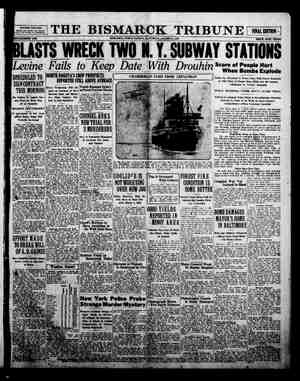The Daily Worker Newspaper, August 6, 1927, Page 5
You have reached the hourly page view limit. Unlock higher limit to our entire archive!
Subscribers enjoy higher page view limit, downloads, and exclusive features.
1 | AGAZINE Section of The DAILY WORKER SATURDAY, AUGUST 6, 1927. 1.—British Economic Interests in China. | yretenscsbas early economic interests in China cen- tred about the opium trade. The opium was pro- duced in India and imported into China by the Brit- ish East India Company, which had secured a mono- poly of Chinese trade. The trade was not direct, however. It was carried on thréugh a guild of Chi- nese merchants at Canton. Opium imports increased rapidly. They were 200 chests in 1729. Between 1820 and 1828 opium im- ports doubled. Between 1828 and 1835 they doubled again. Again they doubled between 1835 and 1839. In the latter year British merchants imported 3,- 823,000 pounds of opium into China—about one hun- dred times the quantity that had been imported in 1729. Meanwhile Chinese officials were doing what they could to stop a traffic that threatened to debauch the entire Chinese nation. In 1800 a series of im- perial edicts were passed, prohibiting the importa- tion of opium into China and also prohibiting its production in China. Despite these efforts, the trade grew. In 1839 the Chinese government made a deter- mined effort to stop the opium trade. A large quan- tity of opium was seized as contraband and des- troyed, and British ships were forbidden to enter Cantonese waters. The result was the First Opium War (1840-1842). A g®od description of these epi- sodes will be found in a book “China and the Na- tions,” by Wong Chin-wai, published in 1927 (Stokes, New York). —Drawing by Fred Ellis. This Magazine Section Appears Every Saturday in The DAILY WORKER. ee British Jmoerialism in China Another Chinaman, J. C. Yu, writes of the First Opium War: “China refused to allow England’s im- portation of opium. England imposed that importa- tion on China by foree. The right and the wrong are clear. No explanation is necessary.” As a result of the First Opium War, China was forced to turn over Hongkong to Britain. This port was then used as a base for opium smuggling until, at the end of the Second Opium War, which began in 1856, the opium trade was legalized at the in- sistence of the British. The First Opium War had another result that was of great consequence to the future of British eco- nomic relations with China. Four Chinese ports were “opened” to British traders. The “opening” of Chinese ports meant that the Chinese merchant guilds no longer held the mono- poly of trade. Instead they were forced to share the trading business with foreign merchants. The plan gave the British merchants an entrance into the Chinese market. It also laid the basis for an economic conflict that eventually brought on the Chinese Revolution of 1911. British trade with China grew rapidly through the middle years of the last century. The yearly average was 10.4 million pounds sterling from 1851- 1855; 16.8 million pounds from 1861-65, and 22.5 millions from 1871-75. There was a change in the ALEX BITTELMAN, Editor —— ae balance and in the character of the trade, how- ever. In the early years, British exports to China greatly exceeded British imports from China. By the end of the century, the situation had been re- versed. The character of the trade had also changed. In the early years, the British merchants sold fin- ished goods, ready for use, to the Chinese market. In the later year, the British manufacturer sold ma- chinery: to China, with which the goods for the Chi- nese market might be produced in China. This point is well made in a recent book “British Imperialism in China,” written by Elinor Burns, and published in London by the Labor Research Department. The value of British machinery exports to China was $235,000 in 1875; $1,475,000 in 1895, and $2,630,000 in 1910. In order to enable the Chinese to pay for these large amounts of capital goods, British bankers loaned money to China. The British share of loans made to the old Chinese governments is placed at $200,000,000. This, added to the private British capi- tal investments, brings the total of British economie interests in China to about $1,500 million. Here, in brief, is the economic basis of British interest in China. It is founded on trade and in- vestments, Its object is economic profit to the Brit- ish trader and investor. 2.—The Flag Follows the Investor Building this vast economic interest in (si Ses been anything but a simple matter. It Ava taxed (Continued on Page 4) RAISE YOUR VOICE IN PROTEST—SAVE THEM FROM THE ELECTRIC CHAIR




